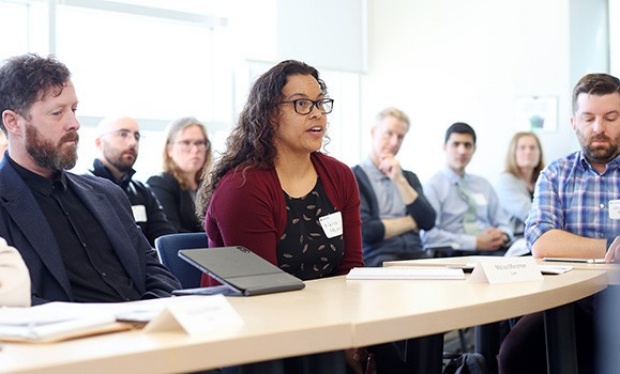Dalhousie University’s Lifting Nova Scotia Workshop Highlights Impact in Unexpected Ways
Last Friday at Dalhousie felt decidedly different than usual — more akin to a choose-your-own-adventure book than a typical workday.
Many laptops were treated to a day of rest as nearly 600 employees converged on the Weldon Law Building for a day of learning and connection. Though structured, many attendees said Dal’s first Lifting Nova Scotia conference felt refreshingly open-ended and fluid.
And that was exactly the point.
“We have a schedule that’s all day long with discussions in every hour slot,” explained Dal President Kim Brooks, kicking off the event in the morning. “That wasn’t because we expected you to go to all of them.”
Instead, she encouraged people to treat the day differently than they might an average one, to be in less of hurry and to embrace curiosity as a guide.
“Take breaks, take some time out in the cafeteria area, come down here and have a coffee with someone you’ve met, talk about an idea, go for a walk,” she said. “This is not a marathon day. It’s a day of joyful exploration that hopefully has some serendipity in it.”
Engaging sessions, inspiring ideas
With 36 different presentations and discussions in a variety of formats to choose from, there was plenty for people to explore.
The day’s scheduled activities included:
Research roundtables that offered a rapid glimpse into the work of dozens of Dal’s scholars and experts from across Dal’s 13 Faculties.
Single-person presentations and Q&As that covered a range of topics, including community-engaged learning, technology disruption and higher education, the intersection of health and artificial intelligence, Dal’s connection and impact on community, frailty and aging, sexualized violence prevention, and much more.
Panel discussions that brought together senior leaders, researchers, experienced administrators, and students to unpack topics such as accessibility and accommodations at Dal, recognition of prior learning, inclusivity at Dal, hybrid-flexible courses, and more.
An unstructured session with some of Dal’s leading experts in green energy designed to actively engage attendees more directly in the discussions.
No matter what sessions people chose to attend, odds were favourable that they walked away with a new appreciation or perspective on the scale, scope, and impact of the work happening across Dalhousie every day.
The topics showcased throughout the day also illustrated how much of this work benefits Dal’s home province of Nova Scotia, either directly or indirectly, and generated new ideas to explore and collaborate on.
“Dal does a tonne already to support this region, but the willingness of people to step up and do even more was incredibly palpable during this event,” said Jeff Myers, director of community partnership and projects in the Faculty of Open Learning and Career Development.
Serving communities in need
For instance, one panel session featuring the heads of Dal’s community outreach clinics offered a snapshot of plans for a new hub that will bring resources from all the centres together under one roof.
Most of Dal’s clinics — from Legal Aid Services and the Social Work Community Clinic to the Centre for Psychological Health and Dal’s many dentistry outreach clinics — currently operate out of standalone locations in communities of need around Halifax and the province. The new hub would add an additional resource to help better serve clients with numerous needs.
“Wouldn’t it be great to be co-located because most of the vulnerable populations that we are managing have numerous needs … and are often the groups that have the most difficulty in accessing other clinics,” said Dr. Ben Davis, dean of the Faculty of Dentistry and one of the people spearheading the initiative.
Dr. Davis explained that the new hub will help clients by reducing the number of clinic visits and cutting down on transportation costs, among other benefits.
Avenues of opportunity
One of the day’s most popular workshops centred around another aspect of Dalhousie’s connection to and impact on community: its “front porch.”
That’s the term session facilitator Tim Maloney used to refer to Dalplex, the Dalhousie Arts Centre, and other athletics and recreation facilities and programs that draw people onto Dal’s campuses in Halifax and Truro.
Maloney said Dal’s front porch creates “avenues” through which members of the community can engage with Dal outside of its primary purpose of educating post-secondary students. These range from grabbing a workout and watching a performance to enjoying logger sports on the Agricultural Campus or dropping a child off at summer camp.
By welcoming people of all ages and background to be physically and socially active, Maloney said Dal helps create a sense of connection that can bolster community.
“As our population continues to grow, we need more than housing to make us a great place to live, work and play,” he said. “The people our province needs greatly need great things to do.”
Following Maloney’s short presentation, participants broke into smaller groups to explore questions about what their own ‘front porch’ at Dal looks like and how it invites people in and what Dal can do to be even more welcoming to community. Enthusiasm was high in the room as people shared back many suggestions, including improved accessibility, more culturally authentic programming, and more spaces to gather.
A day of connection
Many people also took President Brooks’s advice and found time to connect with others outside the structured sessions and roundtables.
Dr. Angela Siegel, assistant dean of academic outreach in the Faculty of Computer Science, felt buoyed by the experience.
“It was an extraordinary day, brimming with brilliant ideas, delightful connections, and active and engaged colleagues.”

